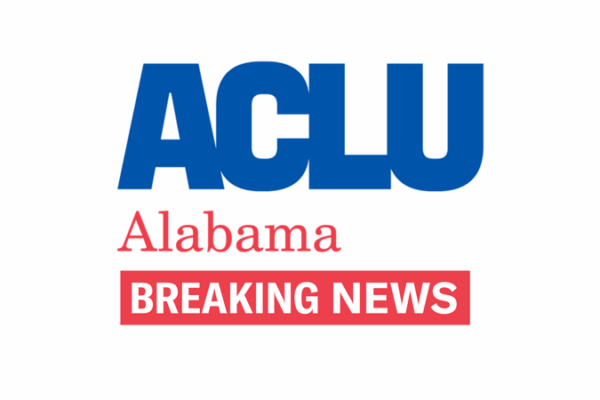MONTGOMERY, Ala. — The Alabama Chapter of the National Lawyers Guild, the ACLU of Alabama, and the First Amendment Clinic at Duke University School of Law filed suit Monday evening against the City of Florence and its Chief of Police Ron Tyler, asserting that they used the city’s parade permit and noise ordinances to discourage protesters from exercising their First Amendment rights.
Since at least June 2020, protesters with local organization Project Say Something (PSS) have engaged in peaceful demonstrations and other political activity protesting a Confederate monument located in front of the Lauderdale County Courthouse. Then, following the murder of George Floyd, PSS continued to demonstrate, ultimately protesting approximately 160 to 175 times before the end of 2020. There were no documented incidents of violence or obstruction by PSS at any of these many demonstrations.
Nevertheless, in 2021, Chief of Police Tyler began conditioning permit requests on payment for unexplained police protection fees, threatening citations, relocating protests to locations with less visibility, and ignoring real threats and harassment from counter-protesters who were not subjected to the same scrutiny.
“Alabama has a long history of confronting racial injustice through peaceful demonstration, and it is imperative that we not lose that ability to speak truth to power when the situation demands it,” said Camille Bennett, founder of Project Say Something. “We have always strived to ensure we follow the appropriate ordinances and have made every effort to work in good faith with city officials to find a way to exercise our First Amendment rights.”
“It is not up to the city or police chief to tell people where and how to protest. The First Amendment holds that everywhere from the Atlantic to the Pacific and Canada to Mexico is a protest zone,” said David Gespass, co-chair of the Alabama Chapter of the National Lawyers Guild.
City law enforcement officers have applied the parade and noise ordinances in inconsistent, arbitrary, and discriminatory ways, which led to a significant decrease in the number of demonstrations organized by PSS, particularly near the courthouse where the Confederate monument is located.
In fact, city officers have applied the noise ordinance so broadly as to even include unamplified human voices, resulting in protesters engaging in at least ten silent protests to avoid retribution from Florence police officers if they vocally protested in their intended location.
“Because of how arbitrarily the noise ordinance was enforced, we were literally silenced by city officers for speaking out,” added Bennett. “But even though we had to protest silently, we will never stop finding ways to be heard.”
“After multiple attempts to negotiate with the City of Florence and its Chief of Police, we were left with no choice but to bring this matter to court,” said Tish Gotell Faulks, legal director of the ACLU of Alabama. “The public interest demands that everyone be able to exercise their First Amendment rights to the full extent guaranteed under the Constitution.”
Project Say Something is a local organization based in Florence Alabama, founded in 2014 by Camille Bennett to confront racial injustice through communication, education, and community empowerment and carries out its mission through various lawful means, like organizing peaceful demonstrations on public sidewalks and common areas near the Lauderdale County Courthouse. More information is available on their website at https://projectsaysomething.org/.
The First Amendment Clinic at Duke Law provides Duke Law students with the opportunity to work directly with clients facing free expression concerns. As part of the Clinic team, law students perform pro bono legal services under the supervision of experienced attorneys. The Clinic specifically represents individuals and organizations with First Amendment claims who would be unable to afford specialized legal assistance without serious financial burdens. Law students are the primary drivers of all legal work performed in the Clinic, from drafting motions and briefs to handling oral arguments. Several bright and talented students were involved in this matter - they include: Jonathan Ellison, Sadie Kavalier, Yoo Jung Hah, Shannon O’Hara, Andrew Webb, and Jenny Wheeler.
Stay Informed
Sign up to be the first to hear about how to take action.
By completing this form, I agree to receive occasional emails per the terms of the ACLU’s privacy statement.
By completing this form, I agree to receive occasional emails per the terms of the ACLU’s privacy statement.

